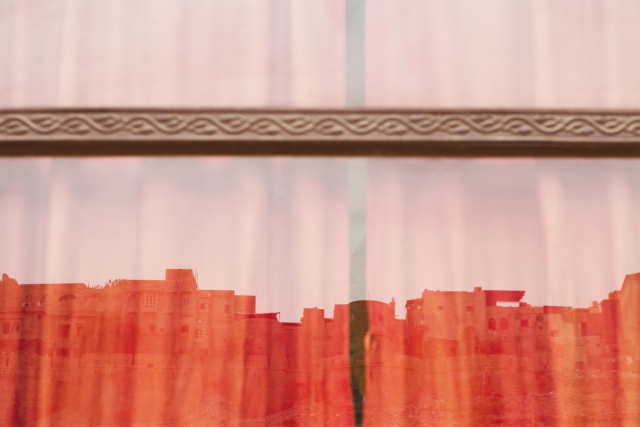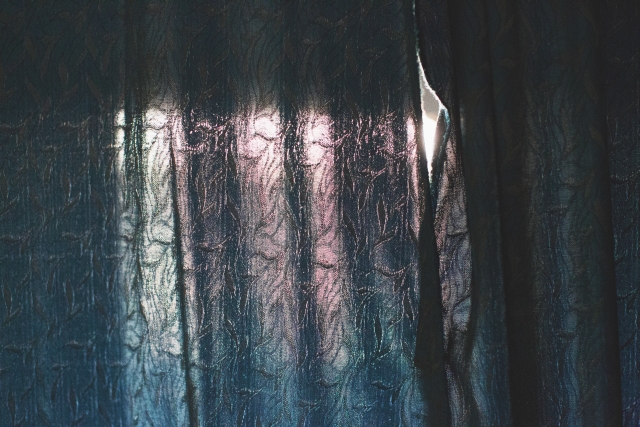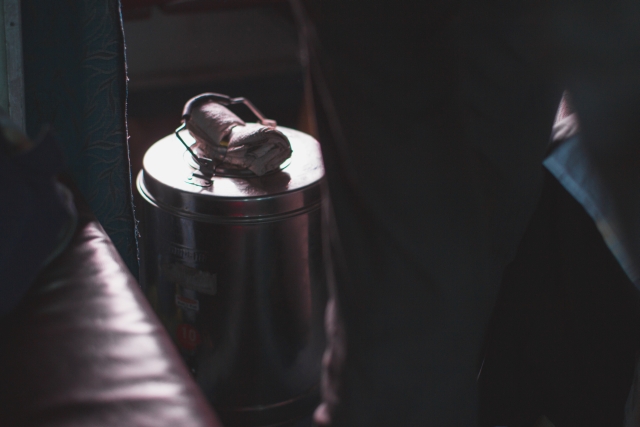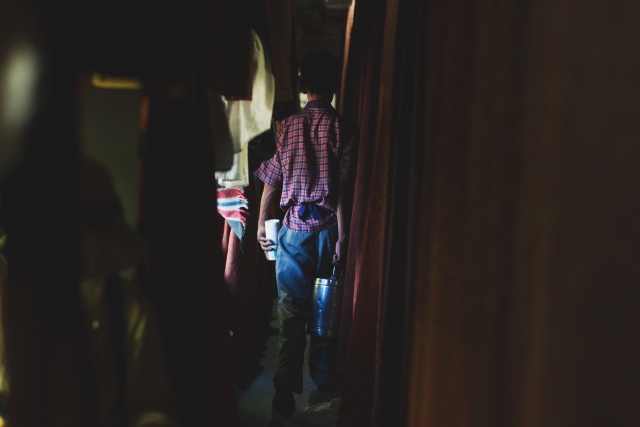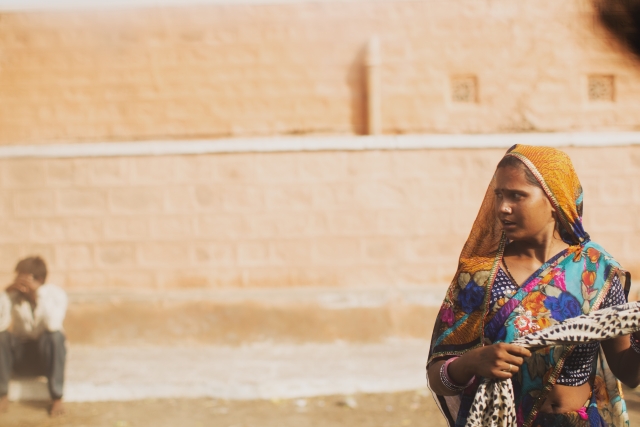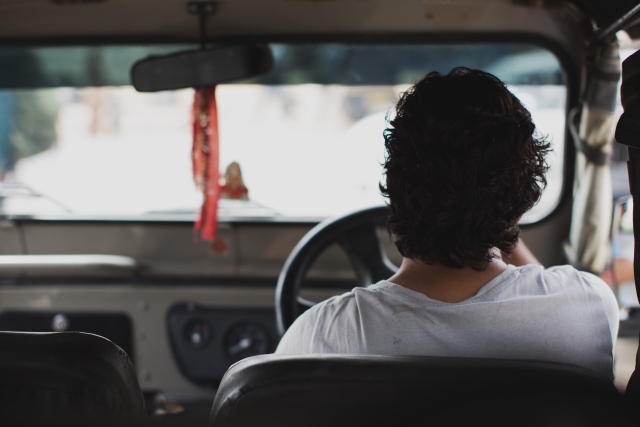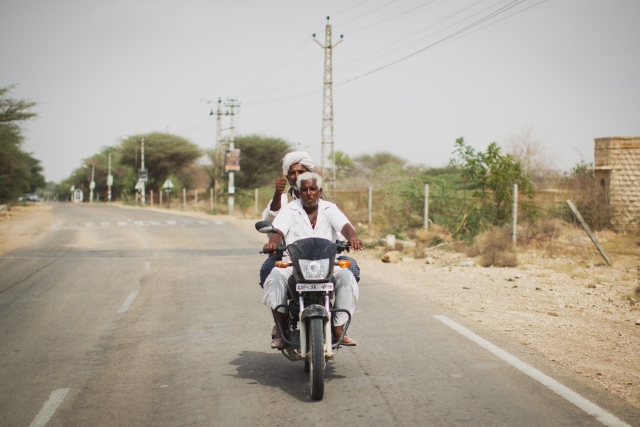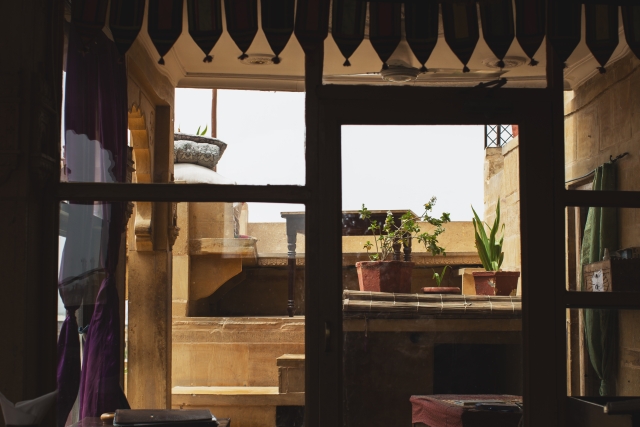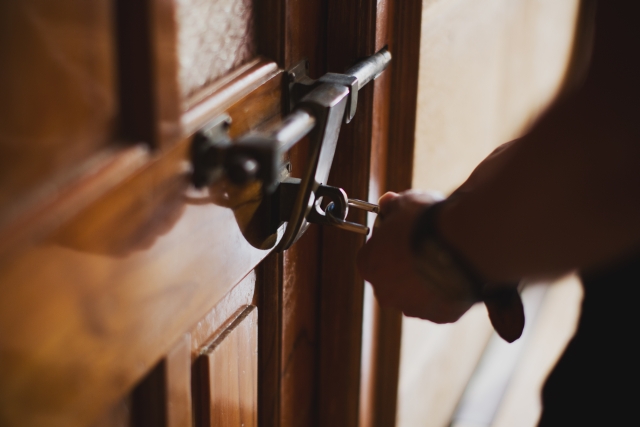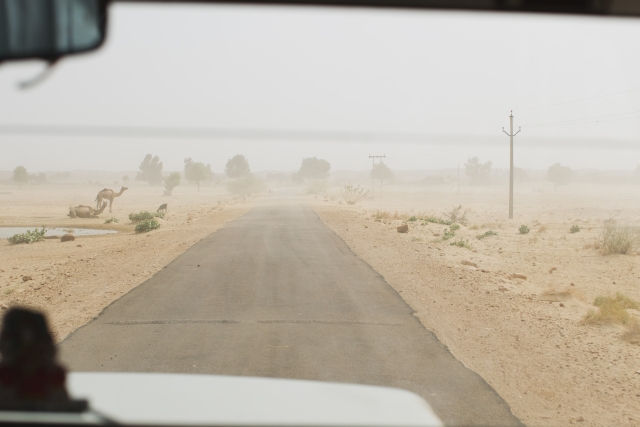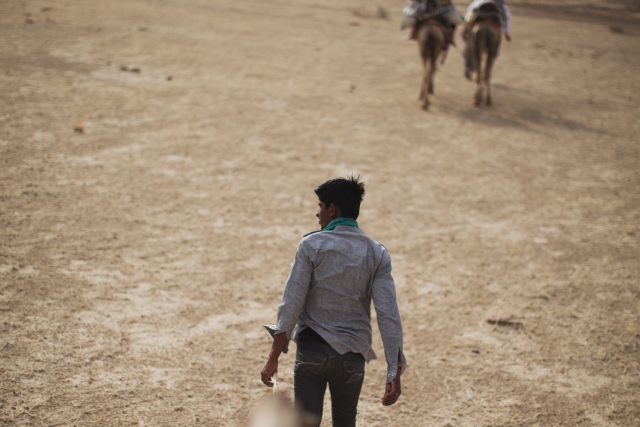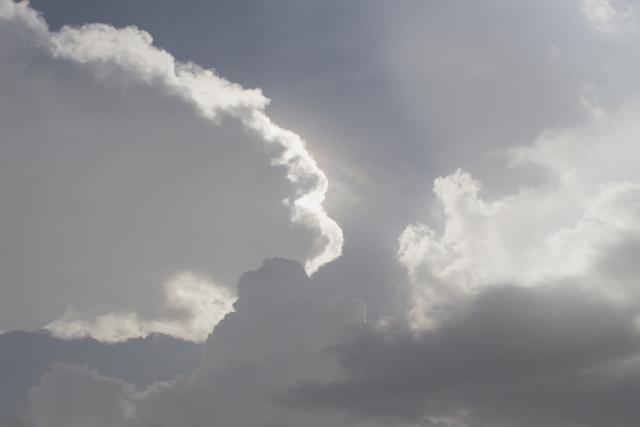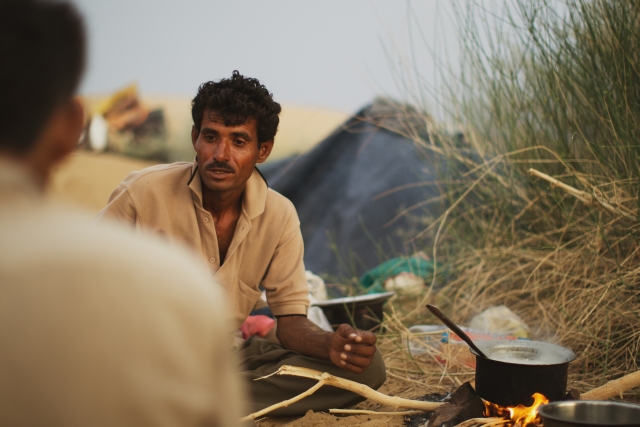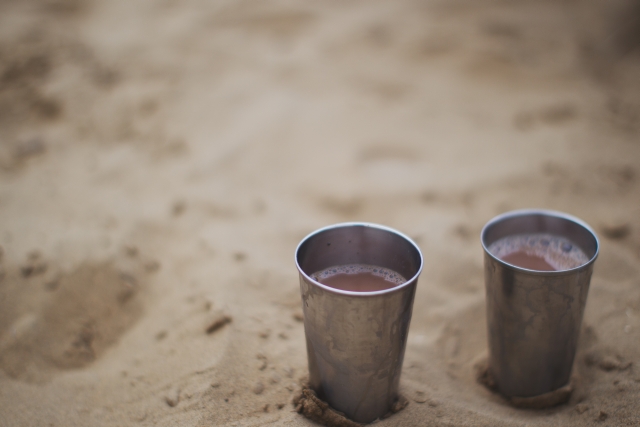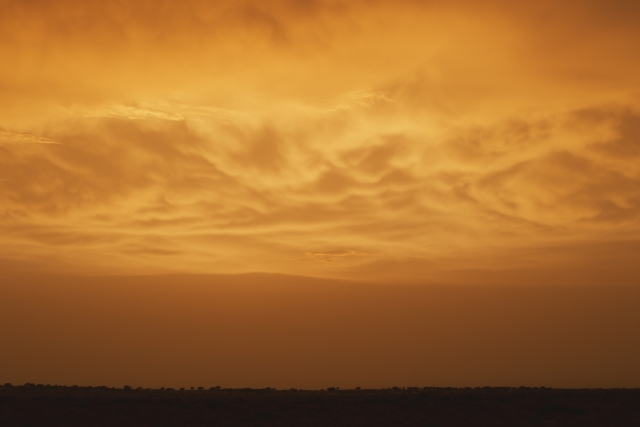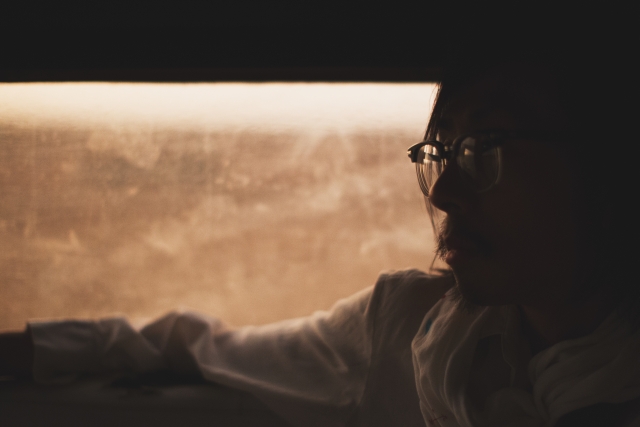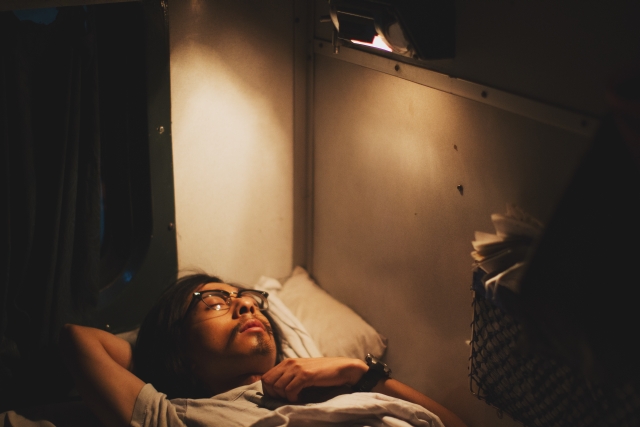Friday, June 21, 2013
Chai around India, Part Three
Golden chai
New Delhi train conked on rails for 18 hours towards the border of Pakistan into lands of Jaisalmer. We sleep but not really. Time goes on. Things go by. Desert brush. Noiseless thoughts. Sometimes landscapes of nothingness. Nothingness is a hyperbole save for when describing death. Better to call it a still, sandy mirror. A rocky upthrust that looks like a misshapen mountain in the center of sand waves at us, everything else a blur in front of it. Isolated tents but not a single soul. Trains are strange. They take you forward. Wherever you sit on a train or wherever you stare, the tracks head away from home or towards someplace far off on a map or even home again, but they know only to push into the future, never going backwards.
Night turns away replaced by paleness through scratched window just as the timing for bird. I realize then that there are no songbirds. Another station stop. Concrete again, something like the day. Two men wipe a metal decanter on their haunches. A few women of unknown age go to their places. I don’t know where since there doesn’t seem be anything in sight other than the station facade. It’s cool, clear, clean, as a desert should be. Em and I have spent some time in the desert. At night the scorpions come out and the wind too, and then after midnight the cold, so that you forgot to move or sleep, and you would wake up before the sunrise without a clock. The feeling in the morning is clean, the surest word for desert we’ve learned.
“I think they’re going to be alright,” I tell Em. I know she knows this too yet we feel the concreteness of the day is and it is still early for how hot the sun is.
A droning gets louder. A man is calling out “chai garam chai garam chai garam chai.” We’re next to the door and he stops just before, as if a camel scoping out a waterhole, but it’s only us. Faded curtain shifts and we three stare. He seems mad but it’s only his tan and folded face of forty-something worked over by forty-something summers of sunshine.
“Chai????” His voice is chai-smooth.
“One please,” Em says with one finger up. Five rupees goes into his hand. Cheap and delicious, says Em. Cheap and real. Real cheap even. The chai wallah’s chai song we have not forgotten for when chai garam chai garam chai is involved in the course of day of our lives somehow, anyhow, small and pointless like a random smell that can’t be found when tried, we think of it and shall think of it always and laugh at how strange it was that it was only us he parted the curtains for, though he could not have seen behind it. Trains are strange truly.
Noon. Our station stop. Big Jaisalmer sign to assure everyone they’re not accidentally in Pakistan. Touts. People who can’t be trusted. Deals that are not such great deals if they lead into a ditch. A scrimmage of held signs outside the station advertising hotels. Palace. Free taxi. Swimming pool. One is a silver jeep and it’s ours. Our instant friend waits for no one else and we’re on the road.
“Someone tried to get us to stay at their place,” I say above the engine. “It’s like one-tenth of everything else here. Of course we thought it was a terrible idea.”
“You’re smart,” he says looking askance, eyes trained back to the dusty road again. Not impressed.
The view of the fort is staggeringly close. So this is how it feels to breathe India. Checking in. Bird perched on second floor window sill shade just outside our room. The colorful curtains swaying. You can see through them and see the sandy colors of the city outside.
Hotel chai to welcome us, to wet our mouths, lips, tongues, desires. Second order, to cure the queasiness in our guts. No, we’re not hungry, and thirsty no longer. Can’t even think about food. One of the brothers, the one that doesn’t smile, gives us his mobile and tells us to call.
“But it’s an international call.”
“That’s fine.”
No human answer. No human fingers that touched those machines in a long time. Em leaves a message on the machine for grandmother. She’s the type to overreact so that should take care of matters. She’ll cover all contingencies.
Booking another desert trip. Sojourns don’t stop for anyone, particularly when someone is down. No leverage to bargain against the serious brother’s kindness. It’s good then we’re not looking for bargains. We’re looking for things worth the cost.
We sit on the rooftop café and watch the fort and the people on rooftops carry on. I sit still but the sweat comes on. Nothing you can do about it. Just sit and sweat it out, sweat it all out. Evening comes closer but colors have not changed save for a small darkness overtaking the horizon.
“We’re going to ride to the Pakistani border,” says our guide the smiley brother. I jump on the back of the jeep and smile at his joke but then I see his own twisted smile and squinting eyes behind round sunglasses. The dusty afternoon cleared. Grey formations were moving in faster. They will move over the city and its last walls of defense that served only ancient empires but not this day.
“What’s today again?” I ask. Time and demarcations lost for weeks now. An hour on your wrist so pointless as schedules in Indian time.
“It’s today.”
“Ah, yes. And a hot day it is.”
“Going to be wet, too.”
Clouds scatter like toads. It stops pouring for a heartbeat. Brilliant desert light filters through. We make some stops. We get back in. We shuffle seats. We make stops. A fort for explorers and not warriors. A land shattered all around. An earthquake. A radioactive leak. Something that scared the residents away. We abandon the ghost heap of bricks and are back on the road. I volunteer for shotgun. Jeep windshield and sunglasses keep me from cold and blindness. Clouds return. Hanging onto the side I smile because there’s no door. Nothing to stop anything from coming inside. Nothing clearer than air between my eyeglasses and the scenery. My face is splashed though my smile is not washed away. If there were waterspots to dirty the view I couldn’t recall them.
The road lost like a ghost. Heavy wings hovering above our shoulders. It’s dark one minute then suddenly bright. Dusty and wet visions of a camel on the shoulder of the road or in a patch of barrenness surrounded by tufts of dried grass. One-lane road. Cars going either way. We see only trucks if cars at all. Thumping engines draws my mind back to New Delhi.
We have avoided yesterday but right now it comes back and can’t be pushed back.
“Dozo yoroshiku onegaishimasu,” I had said bowing.
“Something something something something,” my mother in-law said.
“Hai,” I bow, the only response to a face that’s trying not to reveal the stains of weakness. Saving face for the Japanese is everything. Em’s sister and mother head off towards the armed guard. We get into the taxi and I don’t look back not even at Em right beside me.
Our taxi driver who was commissioned for the day takes us to the train station. 1200 rupees. I give him 1500 and ask for change. He says I don’t have change. Of course. I began playing your game on the third day and that was weeks ago. I give him 1200 exact. He holds the 1000 bill to the sun with a serious eye, I see only his other. Is it real he asks. Of course it’s real. Seriously. Please. Go get it checked or not. Or take it. Sheesh. Fine, he says, smiling. I don’t know what that means but he’s taking it. Okay. Great. Grand. Fantastic. Bloody fantastic.
Security. Metal detector. Conveyer belt. Guy takes the ticket, pauses nonplussed. “Ummm … this is not the right station. See this? This says the old station not this station. This is the new one.”
I squint-stare at him and he seems an honest kid, but hell, ah hell, I snatch the ticket back. Em is horrified but follows me. We go inside the station. “Hey, hey! What are you doing! This is wrong station!” we hear the kid say but he can’t chase because he’s not riding anywhere.
A collection of people like debris waiting to board. We wait around and when we can’t wait we walk around. Our train has not flashed on the board. Where is it? I don’t know. Perhaps they’re slow. They’re not really sharp with schedules, you know. No. Look. The other trains have been posted and they’re around our time. Plus it’s only forty minutes or so. Doesn’t make sense. Let’s go upstairs. Yeah. Gaijin office.
The office is really busy. We are at the end of the queue which begins at the door which is as far as it can stretch, unless if you want to stand outside the office. Air conditioned. Lots of white people. The queue is spelled like Q. Just like that. A letter. A letter. I can think of another letter. F. F. F. F. F. S. S. S. S. Time is drawing nearer and there’s nothing to hold it back. If I could invent something to hold time back, to hold it still, to hold it forever in our hearts, I would be a filthy rich man in ways that money cannot touch with its dirtiness, then I would hold it forever in my heart, all the small, meaningless, terrible, rare, short, single moments with Em, with Kaze, even this one even though insecurity haunted. It could also be argued that a thing that knows death, but does not know of the hour and place, knows how to make art out of the finiteness of life. And so we wait. Wait. Time ticks and I hear it somewhere on the wall. I glance my watch. Yeah. Time. The times. These are the times. Hah!
Em goes to the corner where they’re not servicing anyone because we don’t need to book a ticket or to change our minds or times. We’re here, damn it. We’re here and that’s that. She comes back quickly.
This is the wrong station. Oh fuck are you serious? God I feel like such a prick to the kid now. And now I want to strangle that bad, bad man.
Radio taxi because the meter works and meters don’t negotiate very well or at all really. I try not to look at the watch but watch instead the meter. Oh well. I stare outside. The walls of the Red Fort go on and on. We did not go there. No worries. We’ll go next time. There’s no next time, silly. You say next time and even if you return to the very same spot the spot may be different somehow. That spot is of a different time now. It is not the same, nor will it ever be. That spot is of the next time spot and not of the now spot. Stop yourself when you say next time. There is no next time. Not ever. Next time is a thought for when you’re living in the now but you’re forgetting to. Now is next time already. Time is the fair man’s currency, 86,400 seconds a day. Hear the words of Joseph John Campbell. Eternity is now.
Driver wants 20 extra rupees on top of the fare. “This is a radio taxi,” I say, not that he needs reminding. “My god this is why I hate New Delhi.” He freaks out and apologizes. Listen, driver man, twenty rupees is such chump change I can’t even begin to express to you how much so save to tell you that my father used to break shit in ape-shit anger and destroyed anything in sight of value including my Transformers and G.I. Joes and my porcelain eight-year old ass. Because he felt like it. Now, driver man, had you just asked up front kindly, that would have been different and varying on my mood it might have been better for us all. But what you’re doing is called the fine print in America and that shit is ultra-terrible, even in America. Really, just plain awful. Bad American culture. Bad. Also, eff relativism.
Mcdonald’s. Mcdonald’s is the cleanest area in the old train station. Lights. Middle-class patrons. Indians. Security guard. Inside the Mcdonald’s they’re serving traditional chaat at a counter but it’s not a part of McDonald’s just inside of it, whatever that means. Strange. Maharaja mac sandwich. Strange. Ice in the coke. Oh well. Next door are the restrooms but when you went inside it became a wet prison cell and you forget to breathe. Strange and at times scary.
Outside in the real world again we go to the platforms and look for the boarding sheet with the listed passengers to verify that it’s ours and the cars they’re assigned. Ten minutes until departure. Across the concrete we see two hysterical Japanese. Their eyes are frantic through the crowds.
“Em. Those two look like your mother and sister.”
“Oh my god. What are they doing here?”
We’re already running towards them and see us and close the gap. They begin to talk and won’t stop and they start to cry in between the words. Em takes off her pack and pulls out her passport and trades off with her mother. I don’t understand a thing beyond the switcheroo. It’s all Japanese. A guy steps into the circle of a circus now, just random people trying not to help exactly but trying to find out what’s going on just the same. I don’t care. At some point I thank the guy because he has apparently got our mother and sister this far from the airport and their English is flimsy. I’m holding him and Ro. It’s all I can do. Then when I’m talking to Em again he and mother and sister are running up the stairs and are gone. Twenty minutes or so until their flight departure. Impossible.
“Can we do anything?” I say.
“We have to catch the train. We can’t miss it or it’ll be worse.”
And I know she’s right but by god, it still feels like betrayal, cowardice, selfishness, all wrapped into tight tinfoil and steamed. We still haven’t figured out which cars are which because the bluish gray paint are peeling the pale beige numbers are going with it and the train is long, long.
“AC2 are those down there,” a young European girl says. “Okay? Do you understand?” She thinks we’re mute, scared to talk, or don’t know a lick of English.
“Okay. Thank you so much.” Still not thinking. Just knowing that we owe a lot more.
The seats are facing an empty gray wall. We sit. The train hurtles into the future. There was nothing we could do to stop it.
Spin your head out here and there is nothing. Yet nothing is something here. Recall death, and even that is something. Nothing in the way that utility and phone lines have, poles and trees of artifice that keep civilization civil. Heavy white clouds textured like focaccia. The sky is all one cloud or it’s just pure sky and there’s nothing in it save dullness. The camels clop through the sandiness sticking to anything flat. If it sticks long enough they become hills. Some come into view. Dunes and ridges. Lines that curl. Yellowed grass between abutments. Branches and thorns. The caravan master in a brown light gandora whisks ahead and pulls a slender twig. He strips the dirt and the imperfections and tests it with a thwack-thwack. We can see into the far corners of the world and smell not trace of it. We hear only voices and they carry a short ways and are left softened with each passing step.
The sand is deep in parts and the caravan master breaks the steady sifting of camels by a light whack-whack. The camels surge ahead and you have to hold on or you’ll fall off the wrong side and no one’s gonna go back to get you, or so you fear. There’s a moment when my Yuin PK3s tell me something. Hooves are sprinting across the clear towards the next stable ground and the gray skies wince a little and a little rain drizzles on everything and I hear Sorma, Gumbalo, from their Mirage of the East. I remember the perfection of everything, and perfection is not something I believe, the smell of my wet white shirt and the dung and the static in the air and the stillness though the procession of the singleness of clouds and the heaviness of Sorma in my ears and Em ahead of me, just her back and blue-blue-desert-orange sari. And I remember thinking My god, if you lived here, you could come out into the desert every day. My god, if you lived here, you would live in a desert every day. Your jeep and feet and, if you could fit another dog into India, best friend and your best friend dog would be enough, more than what could ever fit into one small heart in the cornerless world that is India.
The caravan stops and this is where those who will sleep beneath the stars tonight stay but there won’t be any heavens seen. First order, boil water for chai. My god, the finest chai in all of India. My god, the finest chai in all of India. My my my my my. The gods. Chai.
I finish and put down the metal cup into the sand and watch the British couple walk and become smaller beneath a rainbow that had broken out above the dunes. Colors I had forgotten. Colors of all the dyes of cloth and people that wore them and their smiles and strange stares that had brushed by Em and I for a month as a gradient memory. And I remember thinking with certain smugness, My god, Hollywood, you cannot manufacture a better timed romance, so don’t even try. Don’t even try.
THE END
Story by HVH
